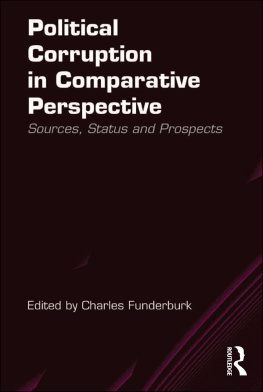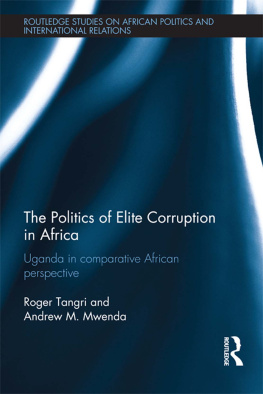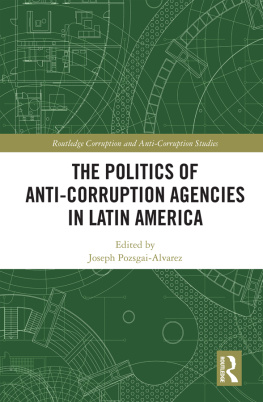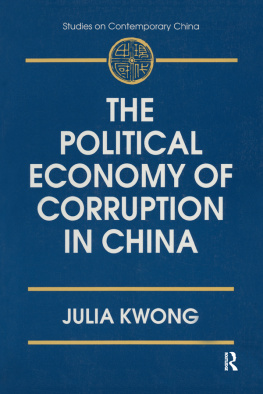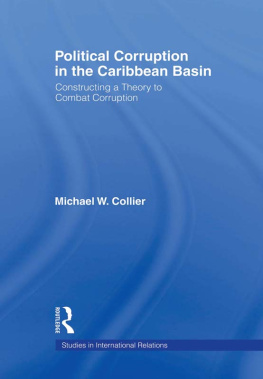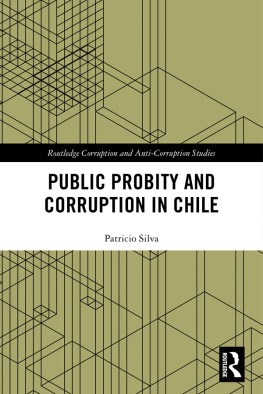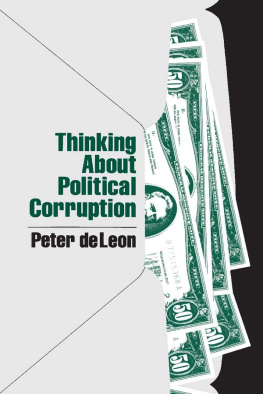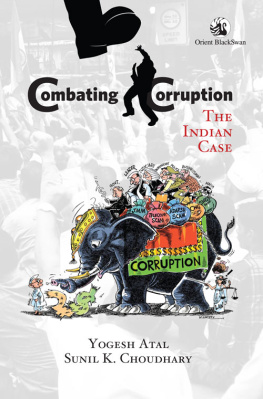POLITICAL CORRUPTION IN COMPARATIVE PERSPECTIVE
Political Corruption in Comparative Perspective
Sources, Status and Prospects
Edited by
CHARLES FUNDERBURK
Wright State University, USA
First published 2012 by Ashgate Publishing
Published 2016 by Routledge
2 Park Square, Milton Park, Abingdon, Oxon OX14 4RN
711 Third Avenue, New York, NY 10017, USA
Routledge is an imprint of the Taylor & Francis Group, an informa business
Copyright Charles Funderburk 2012
Charles Funderburk has asserted his right under the Copyright, Designs and Patents Act, 1988, to be identified as the editor of this work.
All rights reserved. No part of this book may be reprinted or reproduced or utilised in any form or by any electronic, mechanical, or other means, now known or hereafter invented, including photocopying and recording, or in any information storage or retrieval system, without permission in writing from the publishers.
Notice:
Product or corporate names may be trademarks or registered trademarks, and are used only for identification and explanation without intent to infringe.
British Library Cataloguing in Publication Data
Political Corruption in Comparative Perspective: Sources, Status and Prospects.
1. Political corruption. 2. Political corruption Case studies.
I. Funderburk, Charles, 1943
364.1323dc23
Library of Congress Cataloging-in-Publication Data
Political Corruption in Comparative Perspective: Sources, Status andProspects/
[edited by] by charles Funderburk.
p. cm.
Includes bibliographical references and index.
1. Political corruption Case studies. 2. Comparative government.
I. Funderburk, Charles, 1943
JF1081.P652 2012
364.1323dc23
2012004877
ISBN 9781409442509 (hbk)
ISBN 9781315601151 (ebk-PDF)
ISBN 9781317078876 (ebk-ePUB)
Contents
Charles Funderburk
Charles Funderburk
December Green
Liam Anderson
Laura M. Luehrmann
Pramod K. Kantha
Vaughn P. Shannon
Donna M. Schlagheck
Julie Fisher
Vaughn P. Shannon, Charles Funderburk, and Julie Fisher
List of Figures
List of Tables
Notes on Contributors
Liam Anderson is a scholar in the areas of International Relations and Comparative Politics. He is author or co-author of five books, with another two in press, as well as a variety of articles and book chapters. He is a professor at Wright State University and has received several awards for teaching excellence.
Julie Fisher is the author of two books on the nonprofit sector in developing areas and its relationship to civil society, political development, and democracy. From 1997 to 2005, she was a program officer at the Kettering Foundation in charge of international fellows, international meetings on deliberative democracy, international NGOs, the nonprofit sectors relationship with the public, and research on community decision making in the United States. From 2005 until 2007 she was a Kettering associate researching Importing Democracy: The Role of NGOs in South Africa, Tajikistan and Argentina (Kettering Foundation: forthcoming). In 2007 she retired from the Kettering Foundation and presently is an independent consultant.
Charles Funderburk is a professor of Political Science at Wright State University. He has authored or co-authored four books and numerous articles and papers. He teaches in the area of American Politics.
December Green is author or co-author of four books in comparative politics and one in political thought. She has won teaching awards at three different universities, and currently is Director of the International Studies Program at Wright State University.
Pramod K. Kantha teaches at Wright State University in the area of South Asian Politics. He is author of a variety of articles about India, Pakistan, and Nepal.
Laura M. Luehrmann is Director of the Masters Degree Program in Comparative and International Studies at Wright State University, where she has received two awards for Faculty Excellence. She is co-author of a book on comparative politics in the third world, and has written numerous articles and papers about politics in China.
Donna M. Schlagheck is Chair of the Department of Political Science at Wright State University and is Director of the very successful Model United Nations program. She teaches a variety of courses in International Politics and is a consultant with the Defense Institute of Security Assistance Management (DISAM) at Wright-Patterson Air Force Base. She is author of a book about terrorism and co-author of a book about issues in American politics; additionally, she has written numerous articles and professional papers.
Vaughn P. Shannon teaches International and Middle Eastern Politics and is author of a book about the ArabIsraeli conflict, as well as numerous journal articles and book chapters in the field.
Preface
On December 17, 2010, Mohamed Bouazizi came to the attention of the world by setting himself on fire in the town of Sidi Bouzid, Tunisia. Bouazizi was a local merchant who chose this dramatic action as a protest against widespread political and police corruption. Bouazizi decided to immolate himself as a public protest against the frequent demands for bribes that were a routine part of doing business in Tunisia. During the two weeks that Bouazizi lingered near death, anger spread throughout the public and numerous demonstrators were arrested or shot by government security forces. After Bouazizis death in the hospital the anti-government demonstrations intensified and Tunisian president Ben Ali and some of his family fled to Saudi Arabia. Anti-government demonstrations spread to Egypt, Algeria, and Libya and the popular uprisings now known as the Arab Spring were underway. The long-term impact of the Arab Spring remains to be seen. This widespread popular unrest involves more than popular dissatisfaction with political corruption, of course. Citizens were protesting many years of authoritarian rule by brutal dictatorships, but political corruption, bribery, and police abuse were catalysts stimulating these popular protests.
This book is an inquiry into the nature and causes of political corruption, a widespread phenomenon that afflicts all modern societies to varying degrees. The book is composed of original chapters written expressly for this project. Using the case-study format, our authors draw upon their expertise to analyze the causes, extent, and consequences of political corruption in a variety of contemporary societies.
I would like to acknowledge the support of Dean Charles Taylor of the College of Liberal Arts and Donna Schlagheck, Chair of the Political Science Department at Wright State University, for assisting me with released time for research and writing necessary to complete this manuscript. It was a pleasure working with my co-authors, who contributed their expertise and skills to produce a fine collection of chapters. Finally, I wish to thank our excellent secretary Joanne Ballmann and my colleague Vaughn Shannon for their assistance in preparation of the manuscript.

